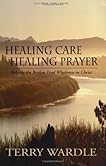 Healing Care, Healing Prayer: Helping the Broken Find Wholeness in Christ by Terry H. Wardle
Healing Care, Healing Prayer: Helping the Broken Find Wholeness in Christ by Terry H. WardleMy review
rating: 4 of 5 starsIn Healing Care, Healing Prayer, Terry Wardle offers Christian caregivers the neglected key to emotional health: spiritual transformation. The wisdom of this book is astounding and perhaps unnoticed by many.
For transformation to occur, Wardle insists that the caregiver be transformed first. The caregiver’s attention to intimacy with God is foremost in his or her responsibility. This is a truth that has been central to my own spiritual development. I must grow in intimacy with God, because he is the source, the power behind all transformation, and because those I lead will become as I am.
From there Wardle goes on to set up a framework for understanding inner healing. His visual of an onion with layers moving from the skin of our life situation, through our dysfunctional behaviors, deeper to our emotional upheavals and lies we embrace and finally through those to the underlying wounds, gave me some practical steps for dealing with what I saw as a frightening process. Like Scazzero(Emotionally Healthy Spirituality Unleash the Power of Authentic Life in Christ), Wardle calls us to face our strong emotions and wounds that we have hidden away in order to function. To my surprise, though I cannot identify any major trauma in my life, I found approaching the unfathomed water of my emotions daunting.
I resonated with Wardle’s use of scripture. I didn’t find him building arguments too many times by psychoanalyzing characters of the Bible, a practice that always strikes me a bit hollow (perhaps it is the approaching of the scripture through the lens of the helping discipline rather than finding the transforming power the stories have to offer in themselves). Rather what stuck out to me was the way Wardle took us to scripture for healing. He offers us the truth of scripture to combat the lies that bind us, but more impressive to me, he takes us to the psalms to find our voice to express our emotions in prayer. I love the psalms. I find myself weeping as I pray them, often. Indeed as I was resisting the work of entering into my emotions and having them out with God, I found I was staying away from the psalms as well, leaving me hollow, and searching for ways to deaden the pain I feared.
Over the past few weeks I have been seeing in many new ways the need for the healing Wardle talks about. I have found myself frustrated and overwhelmed. I found myself doubting that I had the strength to go through this myself let alone lead others through it. My experience has been twofold: I have faced resistance in entering into these waters for my inner healing and I have struggled watching a friend spiraling away.
Becky and her husband came to live with us a few months ago. We invited them for two reasons, one for them – so they would have a place to live, and one for us – so we would have another couple to share the journey of discipleship. Over time we realized both of these things were not working. They started spending their time – days and nights – at other people’s houses; obviously they didn’t need a place at our house. What was worse though, is that they no longer joined us for devotions or showed up a church. Becky went back to drugs, and had fits of anger. I am convinced that she is significantly demonized, and the wounds I am aware in her past are enough to break any heart. She left her husband and our house in the last couple weeks. As much as I have preached healing and deliverance the last few months, I am upset that things could fall apart in our own house so deeply. I am angry with those who have wounded her, and with Becky for her choices, and with God for not breaking through.
At the same time I recognize the pain in my own life. I see the dysfunction in my behavior: my relational fear and my seeking pain killers to avoid confrontation. I recognize lies that both Elaine and I have believed: that we are born to mediocrity, that we suck and are lazy. I recognize the emotional upheaval in my life, as I start to feel the despair and grief that lurks I back away from it, afraid of where the pain will take me. I have come to the place where I have asked God to reveal to me the wounds that have caused this. All the while this process has been difficult, I have resisted it at every step, and since my class work is bound up in this process, my grades have suffered as a result. All in all, Wardle has been right about each step. I hope he is right about the outcome as well.
The practicality of his model is a great strength in Wardle’s work. From giving the caregiver the well to draw from in intimacy with Christ in the beginning to leading the caregiver through the layers of pain to the root, he stands as a guide. My favorite part is when coming to dealing with the deep wounds. The wounded one explores the wound in the context of prayer and asks Jesus to reveal where he was in the scene when the wound happened. I want to go there.
Due to my resistance, I had to re-read the last few chapters to really comprehend what Wardle was getting at. The arguments make rational sense, but making the emotional connection to what he is saying has been surprisingly difficult.
View all my reviews.
No comments:
Post a Comment